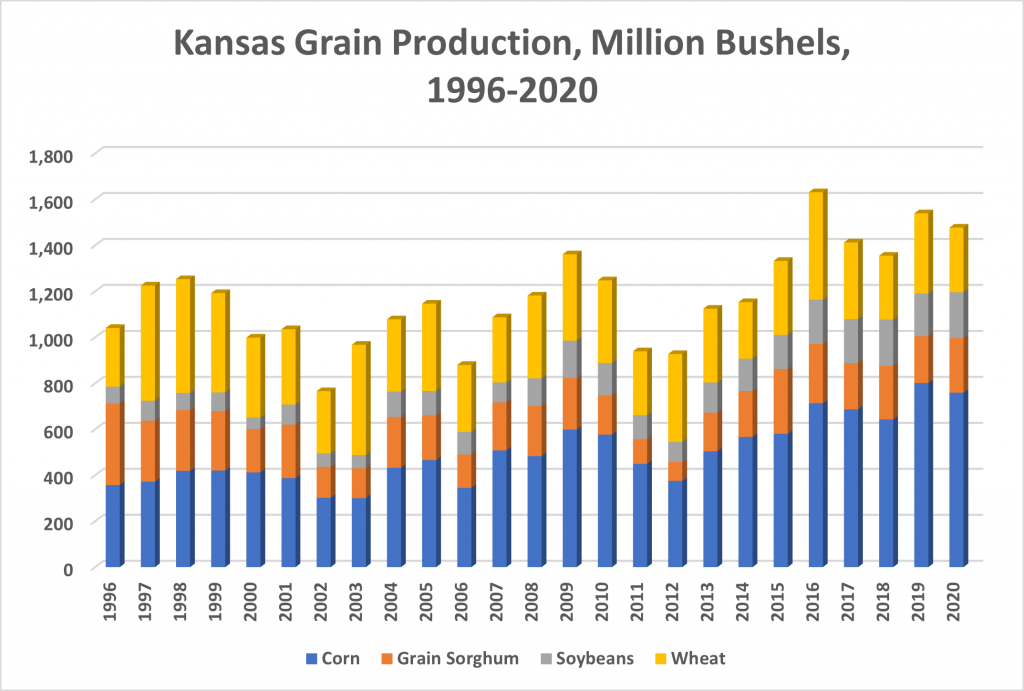Meeting with Kansas Cabinet Officials highlights the importance of rail, highway, and waterways to the Kansas economy
By Josh Roe, VP of Policy and Market Development
This week I represented Kansas Corn in a meeting organized by the Division of Agricultural Marketing at the Kansas Department of Agriculture (KDA) on the importance of our transportation system and its direct impact on producer’s bottom line. The meeting was moderated by KDA Secretary Mike Beam and featured the Secretary of the Kansas Department of Transportation (KDOT) Julie Lorenz, Deputy KDOT Secretary Lyndsey Douglas and Deputy Kansas Department of Commerce Secretary Bill Murphy.
I provided an overview of crop production, a basic session on crop basis and a general corn update as to the headwinds and opportunities faced by corn farmers. Starting off, I presented the following graph which shows corn, grain sorghum, soybean and wheat production over the past 25 years. These are statistics that I have compiled from USDA as far back as USDA keeps records. However, the past 25 years are astonishing, 1996 was the first-year production of these four crops reached 1 billion bushels in Kansas, and in recent years post the 2011-12 drought, Kansas farms have greatly surpassed this mark.
 This was a good segue to talk about how farmers are a “victim of our own success” in that we have figured out how to raise more bushels, on less land, using less water and fewer inputs, but that has led to stagnant and even decreasing prices and widening basis. So, organizations such as the commodity commissions and our partners need to be more focused on growing demand and improving our transportation infrastructure.
This was a good segue to talk about how farmers are a “victim of our own success” in that we have figured out how to raise more bushels, on less land, using less water and fewer inputs, but that has led to stagnant and even decreasing prices and widening basis. So, organizations such as the commodity commissions and our partners need to be more focused on growing demand and improving our transportation infrastructure.
Great discussions were had on how additional facilities, known as a transload facilities, could greatly improve prices, and benefit the Kansas economy. There are multiple markets out there “waiting” on identity preserved and/or sealed container shipments of Kansas whole grains, oilseeds, distiller’s grains, ethanol, flour, soy products, and further processed products such as powdered milk. Deputy Secretary Douglas came from the railroad industry and understands the importance of transload facilities for reaching these markets in all corners of the globe.
On the waterway side, its sometimes easy to forget that even though Kansas is as landlocked as a state can get, there are potential inland waterway opportunities. Specifically, the Port of Catoosa has been an important resource not only for export of commodities but serves as a vital import location for barges of fertilizer. The Port of Kansas City’s agricultural volumes continue to grow and there is a renewed effort to ship containers of grain out of the Port of White Cloud to the north of Kansas City on the Missouri. Deputy Secretary Murphy has in depth knowledge on inland waterways stemming from his time in Tulsa around the Port of Catoosa.
The group plans to reconvene to further discuss these efforts and develop action steps to develop the above-mentioned opportunities. Additionally, we hope to interact with Department of Commerce staff in the coming weeks to discuss grain basis and how additional agricultural processing and transportation networks can lead to not only improved prices, but ripple effects that will benefit the entire Kansas economy.
